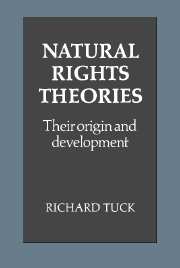8 - The Recovery and Repudiation of Grotius
Published online by Cambridge University Press: 05 June 2012
Summary
Neither of the two traditions of thought which we have seen developing out of Grotius's ideas proved generally attractive in the years after 1660, though Grotius's basic theory continued to exercise an enormous attraction. Some people, such as Vaughan, continued to talk like Sclden; others, such as Velthuysen or de la Court, like Hobbes. And yet both Selden and Hobbes had used what was to many other contemporaries the extremely disquieting idea of a state of total natural freedom. Others again, like the English Whigs, continued to use the principle of interpretative charity, and to put forward a theory that was in some ways the most genuine extension of Grotius available; and yet this tradition had been compromised by its support for the English revolution. In the twenty years after 1660 we find many people trying to recapture something of the authentic character of the original natural rights theory, without finding themselves committed to either of its mid-century adaptations. This was a difficult enterprise, and most of the attempts failed; only one, that of John Locke, came anywhere near success.
The most radical attempt was by the most famous political philosopher of his day, Samuel Pufendorf. A German Protestant working largely in the courts of northern Europe (first Sweden and finally Prussia), he devoted the first part of his working life to a reconstruction of the new natural law ideology.
- Type
- Chapter
- Information
- Natural Rights TheoriesTheir Origin and Development, pp. 156 - 173Publisher: Cambridge University PressPrint publication year: 1979



